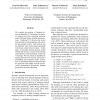Free Online Productivity Tools
i2Speak
i2Symbol
i2OCR
iTex2Img
iWeb2Print
iWeb2Shot
i2Type
iPdf2Split
iPdf2Merge
i2Bopomofo
i2Arabic
i2Style
i2Image
i2PDF
iLatex2Rtf
Sci2ools
112
Voted
EMNLP
2011
2011
Lexical Generalization in CCG Grammar Induction for Semantic Parsing
We consider the problem of learning factored probabilistic CCG grammars for semantic parsing from data containing sentences paired with logical-form meaning representations. Traditional CCG lexicons list lexical items that pair words and phrases with syntactic and semantic content. Such lexicons can be inefficient when words appear repeatedly with closely related lexical content. In this paper, we introduce factored lexicons, which include both lexemes to model word meaning and templates to model systematic variation in word usage. We also present an algorithm for learning factored CCG lexicons, along with a probabilistic parse-selection model. Evaluations on benchmark datasets demonstrate that the approach learns highly accurate parsers, whose generalization performance benefits greatly from the lexical factoring.
EMNLP 2011 | Generalization Performance | Model Evaluations | Natural Language Processing | Systematic Variation |
Related Content
| Added | 20 Dec 2011 |
| Updated | 20 Dec 2011 |
| Type | Journal |
| Year | 2011 |
| Where | EMNLP |
| Authors | Tom Kwiatkowski, Luke S. Zettlemoyer, Sharon Goldwater, Mark Steedman |
Comments (0)

